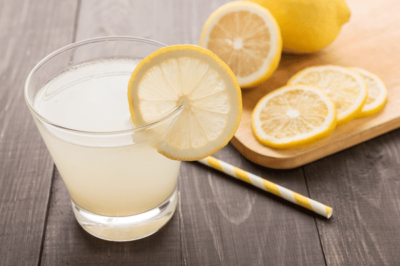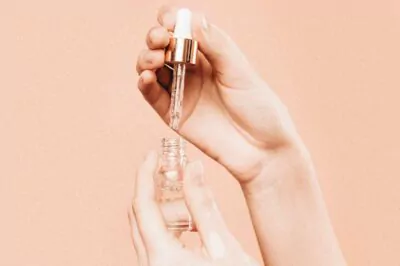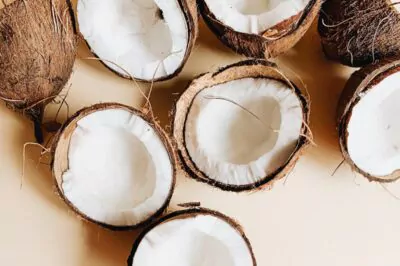Table of Contents[Hide][Show]
Are you getting enough magnesium in your diet?
Truth is, most American adults are not.
If you’re unfamiliar with Magnesium, it’s a mineral that is responsible for numerous functions in the body including energy production, maintaining bone health, transporting calcium and potassium to muscles and maintaining a normal heart rhythm, to name a few. We get most of our magnesium from food, but getting too much can have adverse effects as well.
Getting enough magnesium is important for many reasons including:
- relieving stress
- depression
- headaches
- irritability
- insomnia
- fatigue
- constipation
- leg cramps
- improving memory function
- skin condition
Unless you’re taking supplements, you may not be getting enough of this crucial nutrient in your diet. We’ve got a fun way for you to remedy that—magnesium lemonade! (Scroll to the bottom for the recipe)
The body stores magnesium mostly in the bones, and the rest in soft tissues. Less than one percent remains in the bloodstream, which is why it’s tough to test for adequate levels.
How Much Magnesium are We Supposed to be Getting?
Women should be getting between 310-320 mg per day, while men should be getting 400-420 mg per day.
Several studies have found, however, that a bit more may be best for reducing risk of disease—around the 350-450 mg/day levels.
That can be problematic, however. If you’ve ever taken magnesium supplements, you know that they can act like a laxative. That’s great for daily maintenance, but try to take more than that and you may be uncomfortable.
Why are we Low in Magnesium?
We don’t know exactly why many of us are low in magnesium, but we do have some ideas.
First, the typical American diet, rich in fat, sugar, and salt, is often deficient in magnesium. Processed foods contain significantly less (if any) than healthier, whole foods. A diet high in saturated fat actually reduces the amount of magnesium that the intestines can absorb, and carbonated and caffeinated beverages can reduce absorption as well.
Studies have also suggested that today’s food supply has a reduced magnesium content because of a deficiency of the mineral in the soil. A 2011 Scientific American article noted that because of soil depletion, crops grown decades ago were richer in vitamins and minerals than what most of us get today. A 2008 study on minerals in wheat grain found that though levels in the soil of zinc, iron, copper, and magnesium remained steady between 1845 and 1960, since then, they have decreased significantly. Researchers correlated the findings with the introduction of high-yield crops.
Drinking bottled water, like so many people do these days, also robs us of a good source of magnesium. (Many brands have little to no magnesium.) Even most tap water these days is devoid of the mineral. It used to be that we got a good amount of magnesium from water, but concerns over water purity and the rise in water filters reduced what we consume. Water treatment methods, in addition to getting rid of impurities, also deplete drinking water of minerals.
A number of lifestyle factors can also reduce the amount of magnesium that’s absorbed such as: excess alcohol intake, medications (including diuretics, antibiotics, estrogen, corticosteroids, proton pump inhibitors [like Nexium and Prilosec], and asthma medications), diseases (like Crohn’s disease, ulcerative colitis, type 2 diabetes, and celiac disease) and age—older adults absorb less magnesium in the gut, and also typically consume less magnesium in their diets.
Where do we Get Magnesium?
Most of our magnesium comes from food. It’s widely distributed in plant and animal foods, but the some of the best sources include the following:
- Pumpkin seeds
- Spinach
- Swiss chard
- Soybeans
- Sesame seeds
- Quinoa
- Black beans
- Cashews
- Almonds
- Sunflower seeds
- Fish (mackerel, Pollock, tuna)
- Oatmeal
- Peas
- Bananas
Can You Tell if You’re Deficient in Magnesium?
Most of the time when we’re low on magnesium, we can’t really tell. If you do feel symptoms, however, they may include trouble sleeping, Irritability, anxiety, stress, headaches, fatigue, higher incidence of allergic reactions, muscle soreness, cravings for carbs, poor short-term memory, and/or constipation.
Considering all these factors, what’s the best way to get more magnesium?
First, start by eating more dark leafy greens and whole foods.
Next, consider using a supplement to help fill in the gaps. If you haven’t taken one before, start slowly to allow your digestive system to adapt.
Finally, to avoid any laxative effects, consider other ways to get more magnesium into your body. Some possibilities are soaking in an Epsom salts bath, making sure you’re getting enough vitamin D (it’s important for the absorption of magnesium), getting enough B vitamins—they also affect magnesium absorption, trying magnesium oil or magnesium spray—both topical applications of the mineral, and eating more raw veggies (cooking destroys some magnesium.)
And, try this: magnesium lemonade! Perfect for summer. (Recipe from Lauryn, our Social Media Coordinator)
Magnesium Lemonade Recipe
- 2 slightly rounded teaspoons of magnesium Natural Calm Original (Unflavored)
- 8 oz of water
- 1 tsp lemon juice or to taste
Mix all ingredients together and enjoy! Tasty hot or cold.
How do you get enough magnesium into your diet? Share your thoughts.
Sources:
PubMed – Dietary magnesium and C-reactive protein levels.
Dumb Little Man – 50 Studies Suggest That Magnesium, Deficiency Is Killing Us
Medical News Today – Low Magnesium Linked To Heart Disease
Linus Pauling Institute, Oregon State University – Magnesium
Derma Mag – Studies Which Demonstrate The Role Magnesium Plays In Maintaining Health
American Family Physician – Therapeutic Uses of Magnesium
Scientific American – Dirt Poor: Have Fruits and Vegetables Become Less Nutritious?
PubMed – Evidence of decreasing mineral density in wheat grain over the last 160 years.








Notin beatz good lemonade on a hot summa day
I have been using Natural Calm for years. I take it every night before bed and it definitely helps me sleep! I also consume tons of dark leafy greens and happen to love pumpkin seeds. So hopefully I’m getting enough!